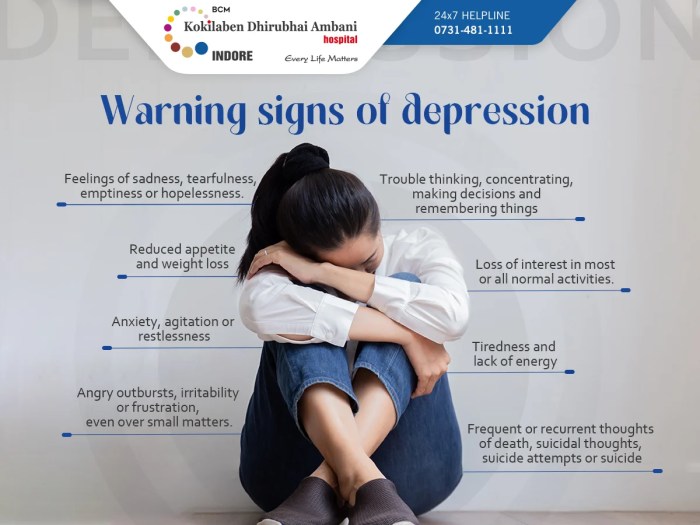Boredom a sign of depression? This exploration delves into the often-overlooked connection between these two seemingly disparate experiences. We’ll unpack what boredom truly feels like, contrasting it with the hallmark symptoms of depression. This journey will reveal potential links, from subtle precursors to worsening existing depressive symptoms. We’ll also explore how to distinguish boredom from other emotional states, discuss contributing factors, and offer practical coping strategies to help navigate these feelings.
From understanding the nuanced differences between boredom and apathy, to examining how social isolation can exacerbate the problem, this post offers a comprehensive view of the potential relationship between boredom and depression. We’ll analyze various factors like lifestyle choices, environmental influences, and societal expectations, shedding light on how these elements might play a role in triggering or sustaining feelings of boredom.
Defining Boredom and Depression
Boredom is a common human experience characterized by a lack of interest or stimulation. It can range from mild feelings of ennui to more intense experiences of emptiness and restlessness. Understanding its nuances is important, as it can sometimes be a precursor to or overlap with more serious conditions. Depression, on the other hand, is a serious mental health condition that significantly impacts mood, thoughts, and behavior.
Distinguishing between these two experiences is crucial for appropriate support and intervention.While boredom can be unpleasant and lead to unproductive behaviors, it typically resolves with engagement or a change in environment. Depression, however, is persistent and pervasive, often requiring professional help for effective management. It is crucial to recognize the distinct characteristics of each to ensure appropriate support is provided.
Defining Boredom
Boredom is a feeling of dissatisfaction, emptiness, and lack of interest. It’s often accompanied by a sense of restlessness or a desire for something more stimulating. This lack of engagement can manifest in a variety of ways, from general dissatisfaction to more pronounced agitation. Boredom can be a temporary state or a more persistent feeling. A temporary episode of boredom is often alleviated by engaging in an activity or seeking new experiences.
Defining Clinical Depression
Clinical depression is a mood disorder characterized by persistent sadness, loss of interest, and feelings of hopelessness. Key characteristics include significant changes in appetite and sleep patterns, fatigue, feelings of worthlessness, and difficulty concentrating. These symptoms are present consistently for an extended period and interfere with daily life activities. It’s important to note that the severity of symptoms can vary greatly between individuals.
Comparing and Contrasting Symptoms
Boredom and depression, while distinct, can share some overlapping symptoms. For example, both can lead to a lack of motivation and reduced energy levels. However, boredom is typically temporary and resolves with engagement, while depression is persistent and often requires professional intervention.
| Characteristic | Boredom | Depression |
|---|---|---|
| Mood | Lack of interest, restlessness, dissatisfaction | Persistent sadness, hopelessness, emptiness |
| Motivation | Temporary lack of drive, followed by engagement | Persistent lack of motivation, often pervasive |
| Energy Levels | Potential temporary decrease in energy | Persistent fatigue, low energy levels |
| Sleep | Minor changes in sleep patterns, usually temporary | Significant changes in sleep patterns (insomnia or hypersomnia) |
| Appetite | Minor changes in appetite (e.g., less hungry) | Significant changes in appetite (e.g., loss of appetite or increased hunger) |
| Duration | Temporary; resolves with engagement | Persistent; requires professional intervention |
Manifestations of Boredom
Boredom can manifest in various ways, from a general feeling of emptiness to specific behaviors like procrastination, restlessness, or irritability. The manifestation depends on individual factors like personality and coping mechanisms. For example, someone might withdraw into themselves, while another might become increasingly agitated or disruptive. In some cases, boredom might be expressed through creative outlets or attempts to find stimulation.
Exploring the Connection

Boredom, a seemingly innocuous feeling, can sometimes be a subtle but significant indicator of underlying issues, particularly depression. It’s not simply a lack of stimulation; it can be a symptom of deeper emotional and psychological struggles. Understanding the connection between boredom and depression is crucial for recognizing potential warning signs and seeking appropriate support. Recognizing the subtle shifts in mood and behavior can help us identify when boredom might be a sign of something more serious.The relationship between boredom and depression is complex and multifaceted.
Boredom isn’t just a feeling; it’s often a symptom of a wider dissatisfaction with life, a lack of purpose, or a feeling of disconnect from one’s surroundings. This dissatisfaction can be a precursor to depressive symptoms, creating a downward spiral where feelings of hopelessness and helplessness take root. In many cases, the initial boredom can escalate into a more profound state of emotional distress.
Potential Links Between Boredom and Depression
Boredom can create a breeding ground for depressive symptoms. A lack of engaging activities can lead to feelings of emptiness and purposelessness, making individuals more susceptible to negative thoughts and emotions. This can create a vicious cycle where boredom intensifies feelings of worthlessness and despair, making it difficult to find motivation for anything.
Situations Where Boredom Might Precede Depression
A lack of meaningful activities or social connections can pave the way for depressive symptoms. Consider an individual who has lost a job and has limited social interaction. This lack of structure and purpose can trigger feelings of boredom, which can then escalate into a sense of hopelessness and helplessness, potentially leading to depression. Similarly, a period of prolonged unemployment, coupled with a lack of social support, can contribute to this negative cycle.
Boredom Worsening Existing Depressive Symptoms
Boredom can exacerbate existing depressive symptoms by reducing motivation and engagement. When someone is already experiencing depressive symptoms, finding the energy to participate in activities can be challenging. The boredom that arises from this lack of engagement can deepen feelings of sadness, worthlessness, and isolation, potentially making it harder to overcome the depressive state. For example, someone struggling with depression might find themselves increasingly bored by tasks they once enjoyed, further reinforcing the negative self-perception.
The Role of Social Isolation in the Boredom-Depression Link
Social isolation often plays a crucial role in the connection between boredom and depression. A lack of social interaction can amplify feelings of loneliness and isolation, contributing to a sense of purposelessness. When individuals are isolated, they may find themselves increasingly bored, with limited opportunities for engaging in activities or connecting with others. This isolation can reinforce feelings of hopelessness and helplessness, further increasing the risk of depression.
Feeling bored all the time can sometimes be a sign of underlying depression. It’s important to recognize these feelings and seek help. Finding ways to live a life free from fear and full of hope can significantly impact your mood and outlook, as explored in this insightful article about 14 ways live life free fear and full hope.
Taking steps to address the root cause of the boredom, like exploring new interests or seeking support, can lead to a more fulfilling and engaging life, ultimately combating the feelings of depression.
How Boredom Can Lead to Feelings of Hopelessness and Helplessness
Persistent boredom can lead to a sense of hopelessness and helplessness, where individuals feel incapable of changing their circumstances. A lack of engagement and stimulation can contribute to a feeling of being trapped in a negative cycle. This can manifest as a sense of powerlessness, believing that nothing can be done to improve one’s situation. This can be particularly prevalent in individuals who feel their life is lacking direction or purpose.
Distinguishing Boredom from Other Issues
Boredom, while often perceived as a minor inconvenience, can sometimes mask more serious underlying emotional states. Differentiating boredom from other negative feelings is crucial for accurate self-assessment and appropriate intervention. Misinterpreting boredom as a symptom of depression or anxiety can lead to unnecessary stress and potentially delay appropriate treatment. This section explores the key distinctions between boredom and other common emotional experiences.
Distinguishing Boredom from Apathy
Apathy, a lack of interest or enthusiasm, often presents as a pervasive feeling of detachment. Individuals experiencing apathy may exhibit a significant decrease in motivation across various aspects of their lives, including work, social interactions, and personal care. Boredom, conversely, is a temporary state of dissatisfaction stemming from a lack of engaging activities. While both conditions can manifest as a lack of drive, boredom is typically less pervasive and more focused on the present lack of stimulation.
Someone experiencing boredom might actively seek out new activities to alleviate the feeling, whereas someone with apathy may feel incapable of initiating or maintaining any activity.
Comparing Boredom to Anxiety and Frustration
Boredom and anxiety, while distinct, can share overlapping characteristics, such as restlessness and a sense of unease. However, anxiety typically involves heightened physiological responses, such as rapid heartbeat, sweating, and difficulty concentrating. Boredom, on the other hand, is characterized by a lack of stimulation, leading to restlessness but not necessarily accompanied by intense physiological symptoms. Frustration, often a response to perceived obstacles or challenges, differs from boredom in its focus on a specific situation or task.
Frustration stems from a struggle to achieve a desired outcome, whereas boredom arises from a lack of engaging activities in general.
Sometimes, boredom can be a subtle sign of depression, masking itself as a lack of interest in usual activities. But it’s important to remember that everyone experiences different levels of engagement with life, and what one person finds stimulating, another might find mundane. This can vary based on things type personalities people don’t often acknowledge, like hidden anxieties or subconscious struggles.
things type personalities people dont delve deeper into these nuanced aspects of human behaviour. Ultimately, if persistent boredom lingers, it’s a good idea to reach out for support, as it could be a sign that something deeper needs addressing.
Contrasting Boredom with Sadness
Sadness, a fundamental human emotion, is characterized by feelings of grief, loss, or disappointment. It is often associated with specific events or circumstances. Boredom, while sometimes co-occurring with sadness, is not inherently linked to a specific cause. Boredom is primarily a reaction to a lack of stimulation or engagement. Sadness, unlike boredom, often involves a deeper sense of loss or disappointment, accompanied by a desire for emotional support and comfort.
Table of Key Differences
| Characteristic | Boredom | Apathy | Anxiety | Frustration | Sadness |
|---|---|---|---|---|---|
| Cause | Lack of engaging activities | Underlying emotional or psychological factors | Internal or external stressors | Obstacles or challenges | Specific events or circumstances |
| Focus | Lack of stimulation in the present | Pervasive detachment across various areas | Physical and emotional distress | Specific tasks or situations | Loss, grief, disappointment |
| Physiological Response | Restlessness, lack of focus | Lethargy, reduced energy | Increased heart rate, sweating, difficulty breathing | Tension, irritability | Tearfulness, fatigue, low energy |
| Motivation | Desire for engagement | Lack of motivation across multiple areas | Potential for avoidance or escape | Drive to overcome the obstacle | Desire for comfort and support |
Potential Contributing Factors
Boredom, a common human experience, can stem from a multitude of interwoven factors. Understanding these contributing elements can shed light on the multifaceted nature of this feeling and its potential connection to other, more serious issues. Often, boredom isn’t simply a lack of stimulation; it’s a complex interplay of personal preferences, environmental influences, and societal pressures.Many individuals experience boredom at some point in their lives, and pinpointing the precise cause can be challenging.
This exploration delves into potential contributors, ranging from lifestyle choices and environmental factors to personal expectations and societal norms.
Lifestyle Choices and Boredom
A person’s daily routine and habits can significantly impact their susceptibility to boredom. Consistent engagement in monotonous activities, limited exposure to new experiences, and a lack of structure can contribute to a sense of emptiness and listlessness. Conversely, a balanced lifestyle with varied interests and stimulating activities can mitigate boredom. For instance, individuals who prioritize consistent physical activity, maintain healthy social connections, and actively pursue hobbies and interests tend to report feeling less bored.
Environmental Factors and Boredom Levels
The environment plays a crucial role in shaping one’s experiences. Surroundings that are predictable, monotonous, or lack stimulation can foster boredom. Conversely, environments that offer novelty, diversity, and opportunities for exploration can combat boredom. Consider the impact of a stagnant, unchanging work environment compared to a dynamic workplace with regular team-building activities and new projects. This illustrates the profound effect of environmental factors on boredom levels.
Societal Expectations and Boredom
Societal expectations can significantly contribute to feelings of boredom. The constant barrage of societal messages about achievement, productivity, and success can create pressure and lead to a sense of dissatisfaction when these ideals aren’t met. Individuals may feel inadequate or experience a lack of purpose if they don’t align with the prevalent societal benchmarks. Furthermore, cultural norms regarding leisure activities and acceptable pursuits can influence perceptions of boredom.
Personal Expectations and Self-Perception in Boredom
Personal expectations and self-perception profoundly influence the experience of boredom. Individuals with high standards or unrealistic expectations might find themselves frequently bored, as their perceived shortcomings do not meet their internal benchmarks. Similarly, a lack of self-awareness and a failure to recognize personal interests and passions can contribute to boredom. The perception of one’s own capabilities and potential can also influence how one interprets and responds to boredom.
A person who views themselves as highly capable may experience boredom as a lack of challenge, while someone who feels less capable may view it as a lack of fulfillment.
Coping Strategies
Battling boredom can feel like a personal uphill battle, but it’s definitely conquerable. Understanding that boredom, in itself, isn’t inherently negative, but rather a signal that something needs attention, is the first step toward effective management. By adopting strategies to re-engage, re-energize, and re-purpose our time, we can move from a state of passive boredom to one of active fulfillment.
This section delves into practical approaches to tackle boredom head-on, and fosters a deeper understanding of how to find and cultivate new interests.
Managing Boredom Effectively
Boredom often arises from a lack of stimulation or engagement. Identifying the root cause of the boredom is key to effectively addressing it. Simply filling the void with any activity isn’t necessarily the solution; the goal is to find activities that genuinely captivate and satisfy. Consider your interests, past hobbies, or even what you’ve always been curious about.
Activities to Combat Boredom
A variety of activities can combat boredom, ranging from the simple to the complex. Engaging in stimulating activities can help shift your focus and create a more fulfilling experience. Examples include trying a new recipe, learning a new language, exploring a local park, volunteering at a community center, or taking an online course on a subject that piques your interest.
The key is to choose activities that genuinely excite you, not just those that fill time.
Finding New Interests and Hobbies
Discovering new interests and hobbies is a journey of self-discovery. This process often involves exploring different avenues, from attending workshops to trying out new sports or arts. Consider revisiting old passions or exploring completely new ones. Even seemingly mundane activities can spark new interests, such as a book club, a local music group, or a photography class.
The key is to remain open to new experiences and to not be afraid to step outside your comfort zone.
Developing a Sense of Purpose
A sense of purpose can be a powerful antidote to boredom. This often comes from identifying your values and aligning your actions with them. Volunteering, starting a small business, or taking on a leadership role in a community group can provide a strong sense of purpose and engagement. Consider what makes you feel fulfilled and meaningful, and seek out activities that align with those values.
Coping Mechanisms Table
| Category | Coping Mechanism | Examples |
|---|---|---|
| Social | Spending time with loved ones | Catching up with friends, attending social events, joining a book club. |
| Creative | Engaging in artistic pursuits | Painting, writing, playing music, crafting, or taking a dance class. |
| Physical | Participating in physical activities | Exercising, going for a hike, playing sports, or taking a yoga class. |
| Intellectual | Learning new things | Reading, taking online courses, attending lectures, or visiting museums. |
| Mindful | Practicing mindfulness techniques | Meditation, yoga, deep breathing exercises, or spending time in nature. |
Seeking Help
Sometimes, navigating feelings of boredom or depression can feel overwhelming. Recognizing when professional help is needed is a crucial step towards well-being. It’s a sign of strength, not weakness, to reach out for support when you’re struggling. This section Artikels when professional intervention is beneficial and provides resources to guide you through the process.
When Professional Help Is Necessary
Persistent or severe boredom, or if it significantly impacts daily life, warrants professional attention. Similarly, symptoms of depression that interfere with work, relationships, or daily routines signal a need for intervention. This includes feelings of hopelessness, worthlessness, loss of interest in activities, changes in appetite or sleep, and persistent fatigue. If you’re experiencing thoughts of self-harm or suicide, immediate professional help is critical.
Signs Indicating Intervention for Boredom or Depression
Several signs can indicate the need for professional intervention, both for boredom and depression. These include:
- Significant disruptions in daily routines, such as work, school, or social activities.
- Persistent feelings of sadness, hopelessness, or emptiness, lasting for more than two weeks.
- Loss of interest in previously enjoyed activities.
- Changes in sleep patterns, such as insomnia or excessive sleeping.
- Changes in appetite, leading to significant weight loss or gain.
- Fatigue or lack of energy that persists despite adequate rest.
- Difficulty concentrating or making decisions.
- Withdrawal from social activities and relationships.
- Recurring thoughts of death or self-harm.
Support Systems and Resources
Numerous support systems and resources are available to help individuals experiencing boredom or depression. These resources can offer guidance, support, and direction.
- Local mental health clinics: These clinics offer a wide range of services, including therapy, counseling, and support groups.
- Community mental health centers: These centers provide affordable or subsidized mental health services.
- Online therapy platforms: Online platforms provide accessible mental health support, often at more convenient times and lower costs than traditional clinics.
- Crisis hotlines: Crisis hotlines offer immediate support for individuals in distress, including those experiencing suicidal thoughts.
- Support groups: Support groups provide a safe space for individuals to share their experiences and connect with others facing similar challenges.
Mental Health Professionals to Consult
A range of mental health professionals can help address boredom or depression.
| Professional | Specialization |
|---|---|
| Psychiatrist | Medical doctor specializing in mental health, can prescribe medication. |
| Psychologist | Trained in therapy and assessment, offering various therapeutic approaches. |
| Counselor | Trained to provide support and guidance, focusing on specific life issues. |
| Social Worker | Focuses on social and environmental factors contributing to mental health, connecting individuals to resources. |
Initiating a Conversation with a Healthcare Provider
Initiating a conversation about boredom or depression with a healthcare provider can be a pivotal step towards seeking help. Be prepared to describe your symptoms, their duration, and any impact on your daily life. Honesty and openness are key.
“The first step is always the hardest, but it’s a necessary step to take towards recovery and well-being.”
Feeling bored all the time can sometimes be a sign of underlying depression. It’s important to prioritize your mental well-being, and that includes managing your finances effectively. Learning how to avoid debt in your 20s is crucial, and checking out these 10 tips can help you avoid unnecessary stress. 10 ways avoid getting into debt your 20s These strategies can free up mental space, potentially reducing feelings of boredom and increasing overall happiness.
So, if you’re feeling unmotivated and bored, it might be a good idea to explore ways to improve your financial situation.
Illustrative Examples
Boredom, while a common human experience, can sometimes be a subtle symptom of deeper issues, particularly depression. Understanding the nuances of boredom is crucial in differentiating it from a temporary state or a manifestation of other problems. This section provides examples to illustrate various contexts in which boredom can manifest.
Boredom as a Symptom of Depression
A young professional, Sarah, has always enjoyed social gatherings and actively pursued hobbies. However, lately, she finds herself increasingly disengaged from activities she once cherished. She feels a pervasive sense of emptiness and lack of motivation, even when surrounded by friends. While she may outwardly appear bored, the underlying cause is a depressive episode. This lack of interest in previously enjoyable activities is a key indicator.
The boredom isn’t just a temporary state; it’s a symptom of an underlying sadness and hopelessness.
Boredom as a Temporary State
Mark, a college student, has a long weekend ahead of him. He has finished his exams and has no particular plans. He finds himself scrolling through social media, not feeling particularly engaged, but not feeling any profound sadness or despair. This lack of immediate engagement is perfectly normal during periods of leisure and relaxation. He is simply taking a break from structured activities, and this lack of stimulation is a temporary state, not indicative of a deeper issue.
Case Study: The Link Between Boredom and Depression
A 30-year-old woman, Emily, had always been a highly motivated and active individual. She held a demanding job and actively participated in volunteer work. Over a period of several months, she experienced increasing feelings of emptiness and detachment. Previously stimulating activities lost their appeal, replaced by a pervasive sense of boredom. She struggled to find motivation for anything, even simple tasks.
Eventually, she sought professional help, and the diagnosis confirmed clinical depression. The shift from engagement to profound disinterest in previously enjoyable activities highlighted the connection between boredom and the symptoms of depression.
Boredom as a Symptom of Another Underlying Issue
A teenager, David, experiences periods of intense boredom, particularly when he’s at home. His boredom is accompanied by anxiety and irritability. He may have difficulty concentrating in school. While depression could be a factor, his symptoms suggest an underlying anxiety disorder or an adjustment disorder stemming from a significant life change. It is essential to consider other possible underlying issues to provide accurate support.
Boredom Due to Lack of Engagement
A stay-at-home parent, Maria, has been caring for her children for years. While she loves her children, she feels a sense of boredom and lack of fulfillment. Her routine lacks variety, and she hasn’t pursued any personal interests or activities outside the home. This boredom is a direct result of the lack of stimulation and opportunities for engagement.
Her boredom is directly tied to the lack of opportunity to pursue her interests and engage in fulfilling activities.
Understanding Context: Boredom A Sign Of Depression
Boredom, a seemingly simple feeling, is actually deeply intertwined with the environment we inhabit. Its experience isn’t uniform; it’s shaped by a complex interplay of cultural norms, socioeconomic standing, personality traits, and life stage. Understanding these contextual factors is crucial to comprehending the nuances of boredom and its potential relationship with more serious conditions.The way we perceive and react to boredom is influenced by a multitude of external and internal factors.
From the societal expectations placed upon us to the individual personalities we carry, boredom is not a universal experience, but a uniquely human response.
Cultural Influences on Boredom, Boredom a sign of depression
Different cultures have varying attitudes toward leisure and idleness. In some cultures, downtime is viewed as a necessary break, an opportunity for reflection and creativity. In others, inactivity may be perceived as unproductive or even shameful. These cultural values can significantly impact how individuals experience and interpret feelings of boredom. For example, cultures that prioritize work and achievement might view extended periods of leisure with a sense of unease or guilt, making individuals feel more bored during unstructured time.
Conversely, cultures that emphasize mindfulness and reflection might embrace moments of idleness, finding meaning in them.
Socioeconomic Factors and Boredom
Socioeconomic factors play a critical role in shaping the experience of boredom. Individuals from lower socioeconomic backgrounds often face greater financial pressures and limited access to leisure activities. This can lead to a feeling of being trapped in a monotonous routine, increasing the likelihood of experiencing boredom. In contrast, those with higher socioeconomic status may feel bored due to having access to a wide array of activities but lacking intrinsic motivation or purpose in their pursuits.
The availability of resources, opportunities, and experiences significantly affects the context within which boredom arises.
Personality Types and Boredom Perception
Personality traits also influence how individuals perceive and respond to boredom. Some individuals are inherently more prone to boredom than others. For instance, individuals high in neuroticism might experience boredom more intensely, while those high in conscientiousness may find it challenging to engage in activities that feel unproductive. People with a high need for stimulation may struggle with monotonous tasks, while others may thrive in routine.
Different personality types can interpret boredom as a lack of engagement, or a symptom of a more complex emotional state.
Life Stages and Boredom
Life stages significantly influence the experience of boredom. Children may experience boredom when their play is limited or structured in ways that don’t allow for exploration and creativity. Teenagers, navigating identity formation and social pressures, may find themselves bored with routine tasks and expectations. Adults in the prime of their careers might feel bored by a stagnant job or lack of growth opportunities.
Similarly, individuals in retirement may experience boredom due to a lack of purpose or engagement in meaningful activities.
Demographic Variations in Boredom
Boredom can vary across different demographics, including age, gender, and ethnicity. For example, certain age groups may find particular activities more or less engaging, influencing their experiences of boredom. Likewise, gender roles and expectations can shape how men and women perceive and express boredom. Furthermore, ethnic backgrounds and cultural norms can impact the types of activities considered stimulating or fulfilling.
This suggests a significant diversity in how boredom is perceived across different demographic groups.
Epilogue

In conclusion, while boredom can be a temporary state, understanding its potential connection to depression is crucial. By recognizing the subtle symptoms and potential contributing factors, we can develop effective coping strategies. Seeking professional help when needed is vital. This exploration aims to provide a clearer understanding of the complex relationship between boredom and depression, empowering individuals to navigate these challenging emotions and prioritize their well-being.










